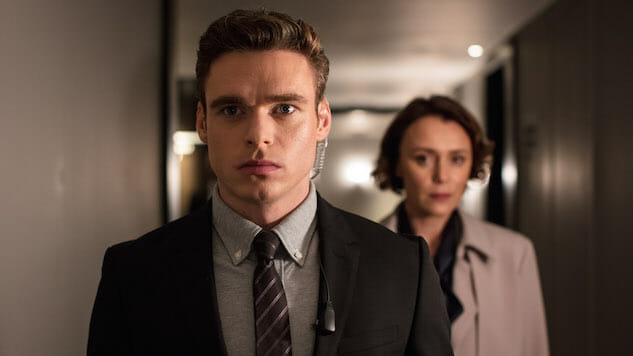Why Bodyguard Should Be Your Next TV Obsession
Photo: Sophie Mutevelian/World Productions/Netflix
At first glance, Bodyguard’s opening sequence is familiar enough: Square-jawed tough whirs into action on a London-bound train, desperate to stop a suicide bombing. Commuters evacuate the endangered cars. The perpetrator and the trigger-happy counterterrorism police come to a standoff, our hero holding the middle ground. But in Jed Mercurio’s exquisite actioner, which caused a sensation in Britain this summer, there are no rooftop chases, no ticking clocks, no fisticuffs with the villain’s henchmen. Instead, the six-part series finds suspense in watchful camerawork and careful pacing, as Metropolitan Police bodyguard David Budd (Game of Thrones’ Richard Madden) scans the platform for suspicious figures and spots a train employee on high alert. Twenty minutes pass, in often excruciating detail, before the cutaway to David’s home signals the crisis is over, and it’s this thorough control that makes Bodyguard worthy of your next TV obsession: It refuses shortcuts, rejects ellipses, until it approaches the effect of real time.
Rather than treat this as a gimmick, though, Mercurio, Madden, and directors Thomas Vincent and John Strickland use the technique to create potent echoes of the protagonist’s torturous vigilance, and indeed the nation’s. A veteran of the war in Afghanistan, David’s first assignment after thwarting the train attack is to protect Home Secretary Julia Montague (Keeley Hawes), a rising political star with her eye on 10 Downing Street—and a reputation as a national security hardliner. The result is an ingenious layering of form atop function, all within the context of a taut (if implausible) political thriller: Much of Bodyguard is comprised of tight close-ups of Madden’s anxious eyes following restaurant patrons and college conferees, in the name of protecting an advocate of expansive surveillance; much of the rest sees him on the edge of panic, breathing erratically and clenching his teeth, in the name of protecting a proponent of the conflict that caused his trauma in the first place. Bodyguard even implies that David himself might be a danger to Montague: In one remarkable sequence, we see David watching his charge defend her support for the wars in Afghanistan and Iraq on a newsroom monitor, which bleeds into the unnerving image of David rewinding the tape in his darkened apartment. Over and over and over again, until it’s almost painful, we hear her awful self-justification: “That doesn’t require apologizing for the past.”
-

-

-

-

-

-

-

-

-

-

-

-

-

-

-

-

-

-

-

-

-

-

-

-

-

-

-

-

-

-

-

-

-

-

-

-

-

-

-

-








































